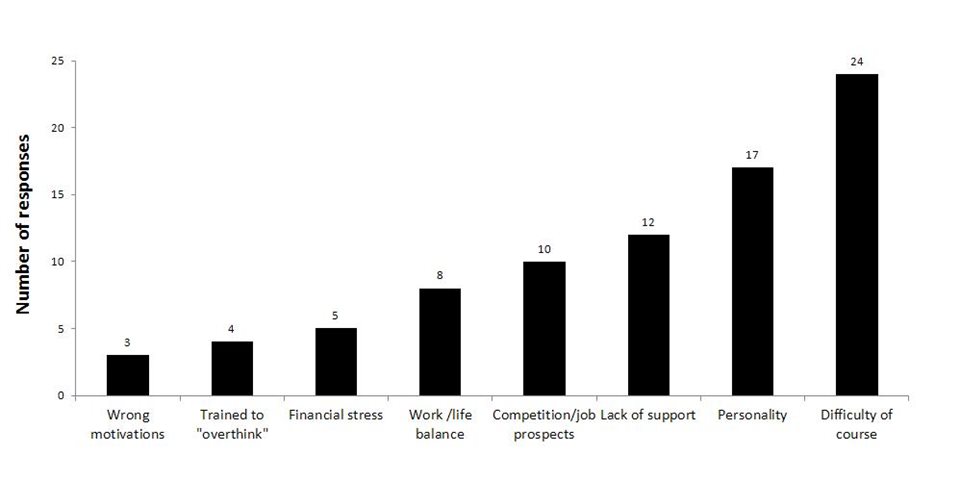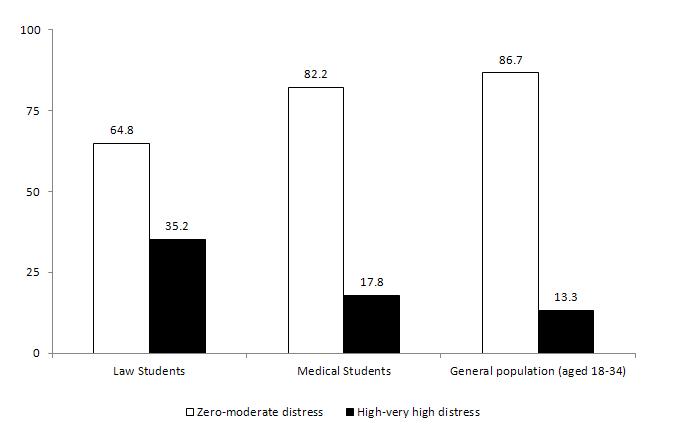Voluminous readings, high-stakes exams and difficult content are the principal reasons for high levels of mental illness among law students, according to Lawyers Weekly readers.
Voluminous readings, high-stakes exams and difficult content are the principal reasons for high levels of mental illness among law students, according to Lawyers Weekly readers.
We recently asked the question, ‘Why do law students experience mental health problems at a higher rate than other students?’ on Lawyers Weekly’s Facebook page.
Pádraig Langsch from Ireland said, “Try to remember 300 cases … when at the same time you know that your entire future will be determined in one exam.”
Noura Abughris commented that there was “too much bloody reading!” — a complaint echoed by many others.
“Having completed a communications degree before this, I can attest that a law degree is like trying to complete four of those communications degrees at once,” commented Rebecca Clare.
The Brain and Mind Research Institute’s Courting the Blues report released in 2009 found that 41 per cent of law students have symptoms of psychological distress severe enough to indicate clinical assessment.
The percentage of law students that suffer high or very high distress (35.2 per cent) is almost twice that of medical students (17.8 per cent). By comparison, only 13.3 per cent of the general population experience severe mental health issues.
Perfectionists by nature, cynics by training
The second major cause of mental illness among law students is personality, according to our readers.
High achievers often have a perfectionist mentality and can elevate their stress levels by placing unrealistic demands on themselves.
“Law attracts a lot of perfectionists. Perfectionism is a very unhealthy mental trait,” said Suzanne Bundesen.
The transition from being the ‘cream of the crop’ at high school to the ‘small fish in the big pond’ can come as a shock to many law students, according to Jesse Spurrell.
Penelope Trundle added, “[Law] is actually quite difficult [but] a lot of people won't admit that because they are smart and have always done well at everything — they have based their self-worth on their ‘intelligence’.
“A lot of [law students] feel VERY threatened by the level of difficulty of the intellectual challenges they are facing.”
Many respondents also said that being trained to critically examine, analyse and deconstruct ideas causes lawyers to view life through a prism of negativity.
“Lawyers [are] ‘trained pessimists’,” said Olivia Bartlett. “We [are] trained to look for problems and worst-case scenarios. Unfortunately, this spills over into our personal lives.”
Rian Terrell agreed, writing, “Engaging in legal reasoning promotes a certain style of paralysis by analysis that starts to bleed over into other aspects of life.”
Feeling the pressure
Lack of support from classmates, professors and friends was the third major contributing factor to law student mental illness, according to our readers.
Fierce competition between classmates, which drives students to do “insane” things like hiding books in the library, was a huge problem, said Langsch.
Michaela Hilder-Achurch, among others, linked the absence of a spirit of cooperation between students to the tight job market.
Fears of unemployment are not unfounded: a recent report showed that one quarter of law graduates who wanted a full-time job could not find one within four months of graduating last year, the highest proportion in two decades.
As well as a lack of support from peers, law students often experience social isolation as they race to complete readings and cram for exams.
“Law students are unlikely to give themselves enough down time and feel guilt when they do,” said Rebecca Clare.
The mind games that some academic staff play to ‘toughen up’ students do little to help the problem, according to Ashley Martinez.
“The idea that some professors have that putting students down, deceiving them in some way in terms of examinations, or in generally treating them with a lack of respect … does nothing more than discourage and add pressures that are unnecessary,” she said.
Figure 1: Reasons why law students experience psychological distress at a higher rate than other students, according to 83 respondents (data sourced from Lawyers Weekly’s Facebook page).
Figure 2: Percentage of law students that experience severe psychological distress compared with medical students and the general population (aged 18-34) (data sourced from Courting the Blues report).





